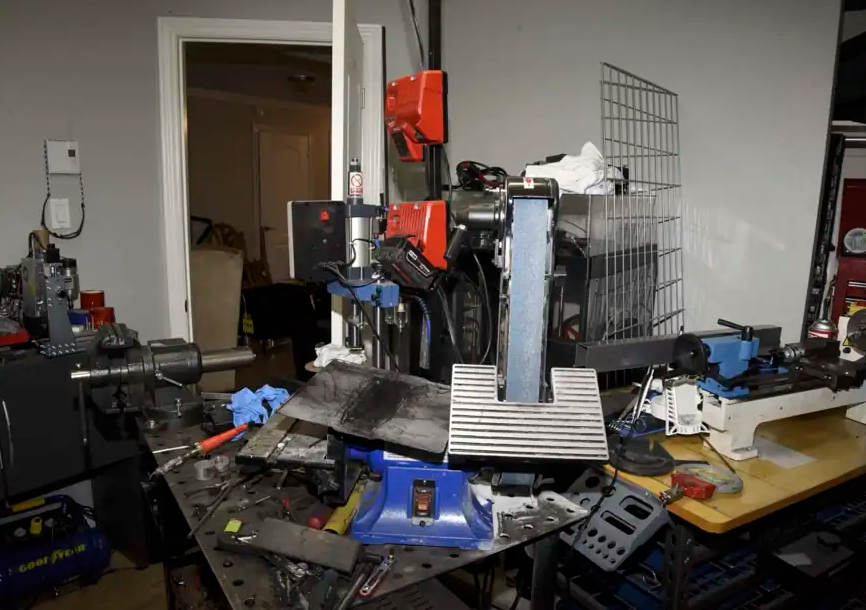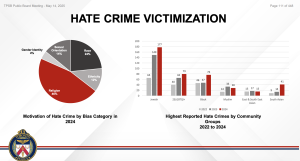A 38-year-old Quebec man has been sentenced to five years in prison for inciting hatred against Jews, attempting to manufacture prohibited firearms, and sharing computer data for doing so.
Pascal Tribout is the first person sentenced to prison in Canada under a new provision of Canada’s Criminal Code that prohibits the possession and sharing of data relating to firearms that can be manufactured with a 3D printer
At a courthouse north of Montreal, Tribout was sentenced to four years for attempting to manufacture prohibited weapons, one year for inciting hatred against Jews, and one year each for possessing and sharing computer plans served concurrently with other terms for time served in detention.
The man from the small town of Saint-Joseph-du-Lac northwest of Montreal, was arrested and charged in June 2024 following a months-long RCMP investigation that resulted in his arrest, along with the seizure of a large quantity of 3D printers, materials and a homemade firearm. Authorities were alerted that Tribout was receiving suspect materials at his address.

According to Lac des Deux-Montagnes Police, Tribout’s apartment represented a weapons manufacturing facility, full of equipment for building firearms, with abundant materials, weapons and machinery.
He remained in custody since his arrest in June and pleaded guilty in December to the three counts.
B’nai Brith Canada’s regional director Henry Topas was present at the sentencing on Feb. 26, and said the verdict is a welcome sign for all Canadians. “This case shows that antisemitism is not only a threat to Jews but also can be a matter of national security.” Topas said he attended “because I believed that it was important that all people present in the courtroom, from the prosecutor to the representatives of the RCMP, to the judge, defence attorney, to the convicted felon and his family, that there was a visibly Jewish person in courtroom.”
Topas says the case, a first for prosecutors in terms of the manufacture and sharing of data, coupled with incitement against Jews, “pretty much stands on its own, in terms of the manufacture of weapons. This is not the nonsense going on in the streets every night. It’s a very different kettle of fish.”
Topas told The CJN in December that Tribout’s online activity was flagged to them, and “as we have done in other such files, we prepared our own file and brought it to the appropriate hate crimes unit based on what was being said online.” The file first went to regional police, which then escalated the case to the RCMP.

Tribout had spread conspiracy theories on the social media platform Telegram, suggesting Jews created the COVID pandemic to target the wider population through vaccines. The court heard that, on an antisemitic online forum, he told an undercover RCMP officer that he supported the idea of death squads to execute Jews and wanted to commit the “perfect crime.” He also boasted that his weapons could resemble paintball guns and were easily destroyed and reduced to “pieces of plastic,” and shared images of the weapon, along with instructions and plans to print guns.
Investigators with the RCMP Integrated National Security Enforcement team found more than two dozen printed weapon frames for pistols and semi-automatic rifles, along with a prohibited magazine, Nazi propaganda materials and 3D-printed bladed weapons. Following ballistics tests and inspections by police, the weapon frames were discovered to be not readily functional and easily broken during handling, resulting in an agreement for a plea to the lesser charge of “attempting” to manufacture a prohibited firearm.
Superior Court judge Sylvain Lépine also noted that Tribout was only a few steps away from successfully completing a useable weapon, and that the manufacture of these weapons was disturbing, agreeing with the joint sentencing recommendation of five years.
“Justice has been done,” said Topas, “and it is clear now to all segments of Canadian society that fomenting hate against any identifiable group will be prosecuted and that there are teeth to the law, so that one will face incarceration. It’s very important to all Canadians, not only the Jewish community.”
As we said last year, this case reminds us that antisemitism can take many forms, including among neo-Nazi and anti-vaccine conspiracies.
— CIJA (@CIJAinfo) February 27, 2025
We welcome this sentence. From arrest to conviction, authorities acted decisively against Tribout and the threat he posed to society. We need… https://t.co/lQ9g5GLEAO
3D-printed guns are the newest form of unmarked and untraceable “ghost guns”, often illegally manufactured or assembled from parts. Either they do not have serial numbers or other markings, or serial numbers or other markings have been obliterated, preventing them from being conventionally traced. According to Public Safety Canada, ghost guns can include 3D-printed firearms, converted airsoft guns, as well as guns manufactured from precision casting, gun kits or assorted components that may be readily available in households.
B’nai Brith had filed a community impact statement in December, reminding the court that Jews are the most targeted minority in Canada: “For the Jewish community of Montreal, which after the Holocaust in Europe became a haven for survivors to rebuild their lives, this dual threat of hatred and the potential for violent action raises horrific fears. Montreal is still home to some elderly survivors and their descendants who bear the scars of their parents and grandparents.
“These scars, combined with the violence we now see on our streets and campuses, make it all the more necessary for the justice system, the last bastion of hope for the community, to stand up and act in the face of these threats.”
Author

Joel has spent his entire adult life scribbling. For two decades, he freelanced for more than a dozen North American and European trade publications, writing on home decor, HR, agriculture, defense technologies and more. Having lived at 14 addresses in and around Greater Montreal, for 17 years he worked as reporter for a local community newspaper, covering the education, political and municipal beats in seven cities and boroughs. He loves to bike, swim, watch NBA and kvetch about politics.
View all posts








